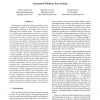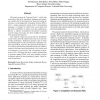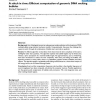10 search results - page 2 / 2 » Exploiting the Rootkit Paradox with Windows Memory Analysis |
MICRO
1999
IEEE
13 years 11 months ago
1999
IEEE
Current microprocessors incorporate techniques to exploit instruction-level parallelism (ILP). However, previous work has shown that these ILP techniques are less effective in rem...
ISCA
1992
IEEE
13 years 11 months ago
1992
IEEE
A quantitative analysis of program execution is essential to the computer architecture design process. With the current trend in architecture of enhancing the performance of unipr...
NDSS
2008
IEEE
14 years 1 months ago
2008
IEEE
Fuzz testing is an effective technique for finding security vulnerabilities in software. Traditionally, fuzz testing tools apply random mutations to well-formed inputs of a progr...
IEEEPACT
1999
IEEE
13 years 11 months ago
1999
IEEE
This paper presents the Cameron Project 1 , which aims to provide a high level, algorithmic language and optimizing compiler for the development of image processing applications o...
ALMOB
2008
13 years 7 months ago
2008
Background: It is of biological interest to make genome-wide predictions of the locations of DNA melting bubbles using statistical mechanics models. Computationally, this poses th...



